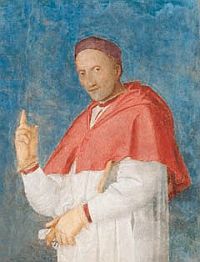

Pietro Barozzi
Venezia 1441 - Padova 1507
Humanist, bishop first of Belluno (1471-1487), then of Padua (1487-1507), Barozzi reconciled literary passion and diocesan responsibilities. In particular, he instituted a Monte di Pietà in Padua in 1491 to fight usury, and he undertook the renovation of the bishop’s residence. He is remembered in particular for the decree he issued on 4 May 1489 – together with the Inquisitor Marco da Lendinara – which declared as excommunicated anyone who publicly professed an Averroist interpretation of Aristotle’s De anima. The measure forced many Padua university professors to revise their points of view: the cases of Nicoletto Vernia and Agostino Nifo are famous. Some commentators also believe that he influenced the commission charged with preparing the bull about the immortality of the human soul, Apostolici Regiminis (1513).
Main works: De modo bene moriendi. Consolatorij libri tres: Officium ad deprecandam pestilentiam. Officium ad impetrandam pluuiam. Officium ad aeris serenitatem poscendam (Venetiis 1531); Il vescovo Pietro Barozzi e il trattato De factionibus extinguendis, a c. di F. Gaeta (Venezia-Roma 1958).
Bibliography: F. Dondi dall’Orologio, Dissertazione nona sopra l'istoria ecclesiastica di Padova, Padova, Tipografia del Seminario 1817, pp. 89 sgg.; M. Bolzonella, Pietro Barozzi vescovo di Padova (1487-1507), Padova, Tipografia del Messaggero 1941; B. Nardi, Saggi sull’aristotelismo padovano dal secolo XIV al secolo XVI, Firenze, Sansoni 1958; Id., Studi su Pietro Pomponazzi, Firenze, Le Monnier 1965; F. Gaeta, Barozzi, Pietro, in Dizionario Biografico degli Italiani, vol. 6 (1964); P. Gios, L' attività pastorale del vescovo Pietro Barozzi a Padova (1487-1507), Padova, Istituto per la storia ecclesiastica padovana 1977; J. Monfasani, Aristotelians, Platonists and the missing Ockhamists: philosophical liberty in pre-reformation Italy, «Renaissance Quarterly», XLVI, 1993, pp. 247-276.